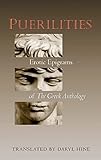Puerilities : Erotic Epigrams of The Greek Anthology.
Material type: TextSeries: Lockert Library of Poetry in Translation ; 62Publisher: Princeton, NJ : Princeton University Press, [2009]Copyright date: ©2001Edition: Core TextbookDescription: 1 online resourceContent type:
TextSeries: Lockert Library of Poetry in Translation ; 62Publisher: Princeton, NJ : Princeton University Press, [2009]Copyright date: ©2001Edition: Core TextbookDescription: 1 online resourceContent type: - 9780691088204
- 9781400824083
- 881/.010803538 881/.010803538
- PA3624 .E75 P84 2008
- online - DeGruyter
- Issued also in print.
| Item type | Current library | Call number | URL | Status | Notes | Barcode | |
|---|---|---|---|---|---|---|---|
 eBook
eBook
|
Biblioteca "Angelicum" Pont. Univ. S.Tommaso d'Aquino Nuvola online | online - DeGruyter (Browse shelf(Opens below)) | Online access | Not for loan (Accesso limitato) | Accesso per gli utenti autorizzati / Access for authorized users | (dgr)9781400824083 |
Browsing Biblioteca "Angelicum" Pont. Univ. S.Tommaso d'Aquino shelves, Shelving location: Nuvola online Close shelf browser (Hides shelf browser)

|

|

|

|

|

|

|
||
| online - DeGruyter Felicia Hemans : Selected Poems, Letters, Reception Materials / | online - DeGruyter The Sense of Music : Semiotic Essays / | online - DeGruyter The Collapse of the Kyoto Protocol and the Struggle to Slow Global Warming / | online - DeGruyter Puerilities : Erotic Epigrams of The Greek Anthology. | online - DeGruyter Constructing Autocracy : Aristocrats and Emperors in Julio-Claudian Rome / | online - DeGruyter Imperfect Sense : The Predicament of Milton's Irony / | online - DeGruyter Hamlet in His Modern Guises / |
Frontmatter -- CONTENTS -- INTRODUCTION -- INDEX OF AUTHORS
restricted access online access with authorization star
http://purl.org/coar/access_right/c_16ec
Elegiac lyrics celebrating the love of boys, which the translator terms Puerilities, comprise most of the twelfth book of The Greek Anthology. That book, the so-called Musa Puerilis, is brilliantly translated in this, the first complete verse version in English. It is a delightful eroticopia of short poems by great and lesser-known Greek poets, spanning hundreds of years, from ancient times to the late Christian era. The epigrams--wry, wistful, lighthearted, libidinous, and sometimes bawdy--revel in the beauty and fickle affection of boys and young men and in the fleeting joys of older men in loving them. Some, doubtless bandied about in the lax and refined setting of banquets, are translated as limericks. Also included are a few fine and often funny poems about girls and women. Fashion changes in morality as well as in poetry. The sort of attachment that inspired these verses was considered perfectly normal and respectable for over a thousand years. Some of the very best Greek poets--including Strato of Sardis, Theocritus, and Meleager of Gadara--are to be found in these pages. The more than two hundred fifty poems range from the lovely to the playful to the ribald, but all are, as an epigram should be, polished and elegant. The Greek originals face the translations, enhancing the volume's charm. A friend of Youth, I have no youth in mind, For each has beauties, of a different kind. --Strat? I've had enough to drink; my heart and soul As well as tongue are losing self-control. The lamp flame bifurcates; I multiply The dinner guests by two each time I try. Not only shaken up by the wine-waiter, I ogle too the boy who pours the water. --Strat? Venus, denying Cupid is her son, Finds in Antiochus a better one. This is the boy to be enamored of, Boys, a new love superior to Love. --Meleager
Issued also in print.
Mode of access: Internet via World Wide Web.
In English.
Description based on online resource; title from PDF title page (publisher's Web site, viewed 08. Jul 2019)


